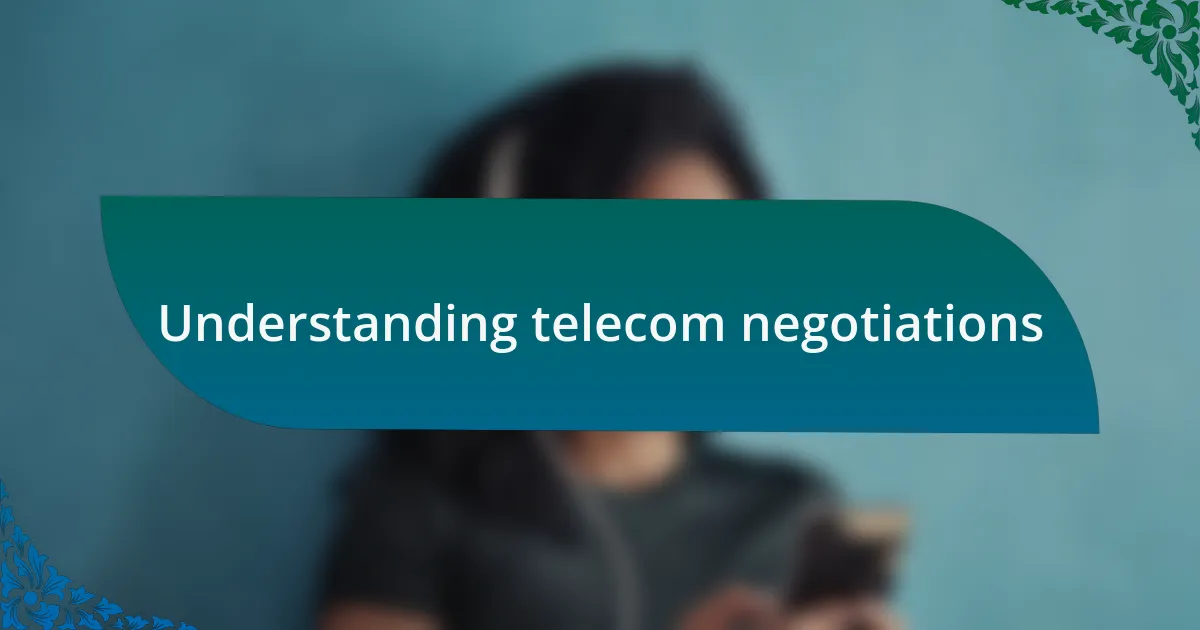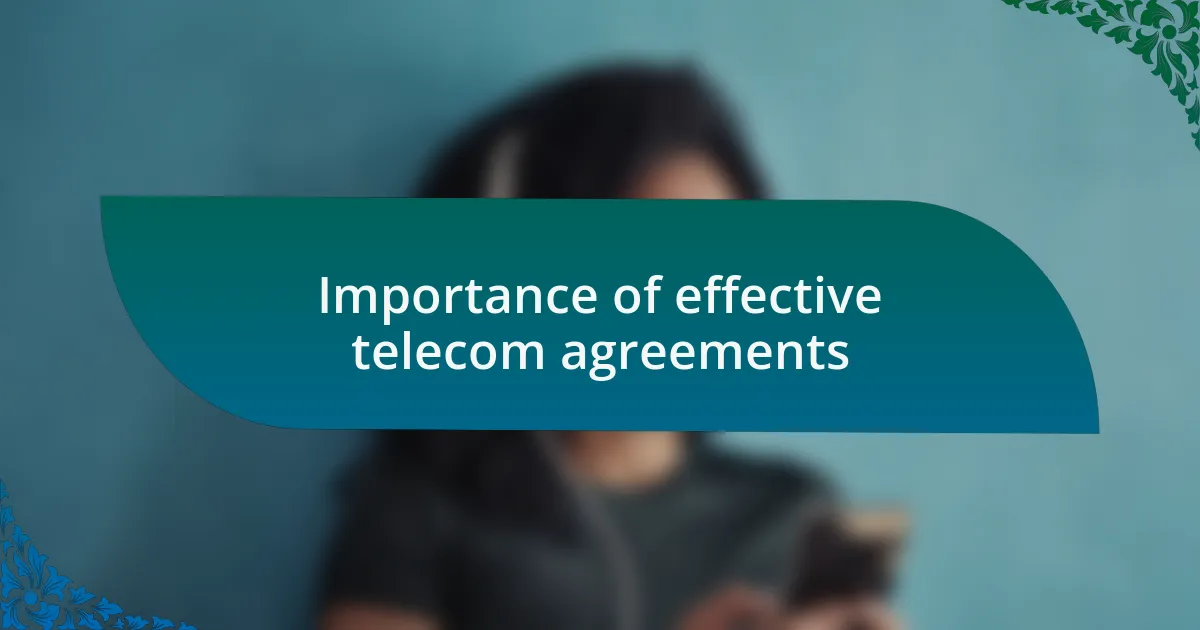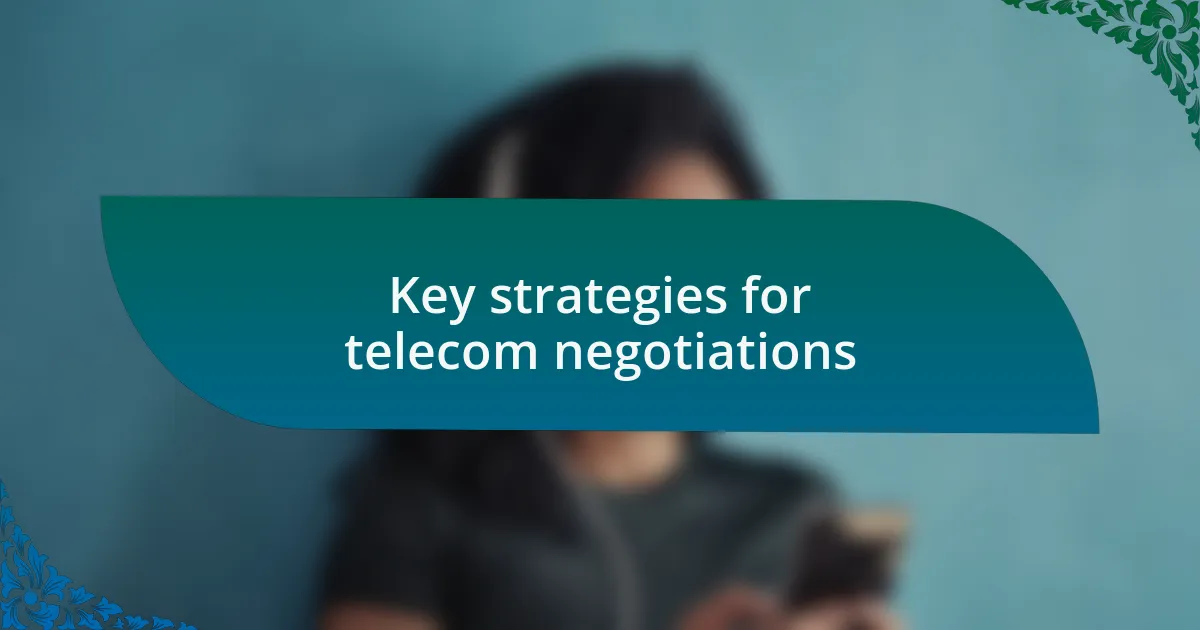Key takeaways:
- Building relationships and establishing trust can transform confrontational negotiations into collaborative discussions.
- Thoroughly analyze contract terms and understand the total cost of ownership to avoid unexpected expenses.
- Preparation and market research can significantly enhance negotiation leverage and outcomes.
- Being open to creative solutions and maintaining clear communication are essential for successful negotiations.

Understanding telecom negotiations
Negotiating in the telecom industry is unlike any other field. The stakes are high, and every detail matters—from pricing models to service agreements. I remember my first negotiation vividly; I walked in thinking I could easily secure a favorable rate, only to realize how intricate the discussions could get. It’s essential to understand the market landscape and anticipate what the other party wants.
One critical aspect of telecom negotiations is relationship-building. When I first approached a large telecom provider, I focused on establishing rapport before getting into the numbers. It was surprising how much easier it became to negotiate terms once there was a level of trust. Have you ever experienced the power of a genuine connection while trying to strike a deal? It can transform what feels like a confrontational process into a collaborative one.
Finally, understanding the technical elements behind the services being negotiated is key. In one negotiation, I sat with a provider and asked detailed questions about their infrastructure and capabilities. This not only demonstrated my knowledge but also positioned me as an informed partner rather than just another client. Are you willing to dive deep into the technical side of things? Doing so could provide you with leverage you never knew you had.

Importance of effective telecom agreements
Effective telecom agreements are not just about covering the basics; they lay the groundwork for successful long-term partnerships. In my experience, having a well-crafted agreement can prevent conflicts down the line and establish clear expectations for both parties. I recall a time when a vague service-level agreement led to frustration and lost revenue. It’s a painful reminder that clarity is key in any negotiation.
Understanding the nuances within these agreements can also translate directly into financial savings and better service. I once worked with a colleague who thoroughly analyzed the fine print of our contract, uncovering clauses that led to unnecessary fees. This practical approach not only saved us money but also reinforced the value of effective negotiations. Have you ever wondered how much you could save just by digging a little deeper into the terms?
Moreover, these agreements foster accountability between parties. In one instance, a lack of clear responsibilities in the agreement resulted in severe downtime for our business. It taught me that every detail of a telecom agreement carries weight. Wouldn’t you agree that a well-defined contract ensures everyone knows their responsibilities and timelines? This certainty can make all the difference in maintaining smooth operations.

Key strategies for telecom negotiations
When it comes to telecom negotiations, preparation is paramount. I always start by researching the provider’s reputation and performance metrics. During one negotiation, knowing their average response time helped me confidently request better service-level agreements. It walked me into the conversation with solid ground, and I often wonder: how much does having that knowledge elevate your position at the table?
Flexibility is another essential strategy. While I believe it’s important to have firm goals, being open to creative solutions can lead to better outcomes. I remember a time when instead of fixating on price, I proposed a tiered service model that met both our needs. The result was a win-win; it’s amazing how a slight shift in perspective can open up new paths. Have you ever had a moment like that, where a bit of flexibility completely changed the negotiation’s direction?
Lastly, clear communication cannot be overlooked. I’ve seen how establishing an open dialogue enables trust and transparency. In one scenario, I was upfront about our budget constraints, which led the provider to offer us a tailored package. It reinforced my belief that vulnerability in negotiations can be powerful. Have you ever tried being honest about your limitations? You might just find that transparency fosters unexpected collaboration.

Common pitfalls in telecom deals
In my experience, one common pitfall in telecom deals is underestimating the total cost of ownership. Often, companies focus solely on the upfront cost, overlooking hidden fees such as installation charges or ongoing service costs. I once neglected these details, leading to unexpected expenses months later. Have you ever been caught off guard by costs that seemed minor at first?
Another trap is failing to scrutinize the contract terms thoroughly. I recall a negotiation where I skimmed through a lengthy agreement and missed a clause that allowed the provider to raise rates after one year. This mistake taught me the importance of reading the fine print, which is just as vital as negotiating the overall price. How often do we rush through important details, only to regret it later?
Moreover, relying too heavily on one vendor can be detrimental. During a negotiation gone wrong, I realized I’d put all my eggs in one basket, which gave the provider more leverage. Diversifying your options not only provides leverage but also fosters a healthier competition among vendors. Have you ever found yourself in a position where dependence led to unfavorable terms?

Personal experiences in telecom negotiations
When it comes to negotiating telecom contracts, I’ve learned the importance of building relationships. One memorable negotiation involved a provider I had worked with for years. Instead of jumping straight into numbers, I took the time to discuss their goals and challenges. This approach not only created a collaborative atmosphere but also led to a better deal than I initially expected. Have you ever experienced the power of connection in negotiations?
In another instance, I faced a challenging negotiation where the stakes were high. The provider was unwilling to budge on their pricing, and I felt frustrated. Instead of pushing back aggressively, I shared my concerns about budget constraints honestly. To my surprise, this transparency led them to offer additional services at no extra cost. Have you ever found that vulnerability can open unexpected doors in a conversation?
Finally, I encountered a situation where timing was everything. I opted to negotiate right before the fiscal year ended, when vendors were more eager to secure deals. This strategic timing allowed me to leverage their urgency, resulting in significant savings. It made me wonder: isn’t it fascinating how the right timing can change the outcome of a negotiation completely?

Lessons learned from telecom negotiations
In telecom negotiations, I learned that preparation is key. For one deal, I dove deep into market research, understanding competitor offerings and pricing structures. This groundwork not only boosted my confidence but also armoured me with facts that shifted the balance of power in my favor. Have you ever felt the transformation that knowledge can bring to a negotiation?
Another critical lesson was the art of patience. I once rushed a negotiation, eager to finalize a contract and move on. But I quickly discovered that taking time to consider each point can reveal overlooked opportunities and potential compromises. Have you ever experienced the clarity that comes from stepping back to rethink a situation? Ultimately, it’s often the pause that reveals the path to a better agreement.
Lastly, I found that clear communication can be a game changer. During a recent negotiation, I made it a point to ask clarifying questions about terms that seemed vague. By fostering an open dialogue, misunderstandings were cleared, and trust was built. Have you recognized how much smoother discussions can flow when everyone feels heard and understood? It’s these exchanges that can lead to a partnership rather than just a transaction.

Tips for successful telecom outcomes
When navigating telecom negotiations, setting clear priorities can significantly shape the outcome. I often start by identifying my non-negotiables—those elements that are essential for the deal to work. This clarity has helped me avoid unnecessary compromises. Have you ever realized that knowing what you stand for can make it easier to say no to offers that don’t align with your goals?
Another technique I’ve found effective is the power of rapport-building. In one negotiation, I took the time to connect personally with the other party, sharing insights about our respective companies’ missions. This simple step transformed our interaction from mere transaction to collaboration. How vital do you think it is to establish trust upfront when you’re at the bargaining table?
Finally, always be prepared to walk away if the terms don’t meet your needs. I recall a negotiation where, despite my efforts, the other party wouldn’t move on key points. My readiness to leave sparked a change in their approach, leading to a more favorable offer. Have you ever found that standing firm can lead to better opportunities, even if it means saying goodbye to a current deal?